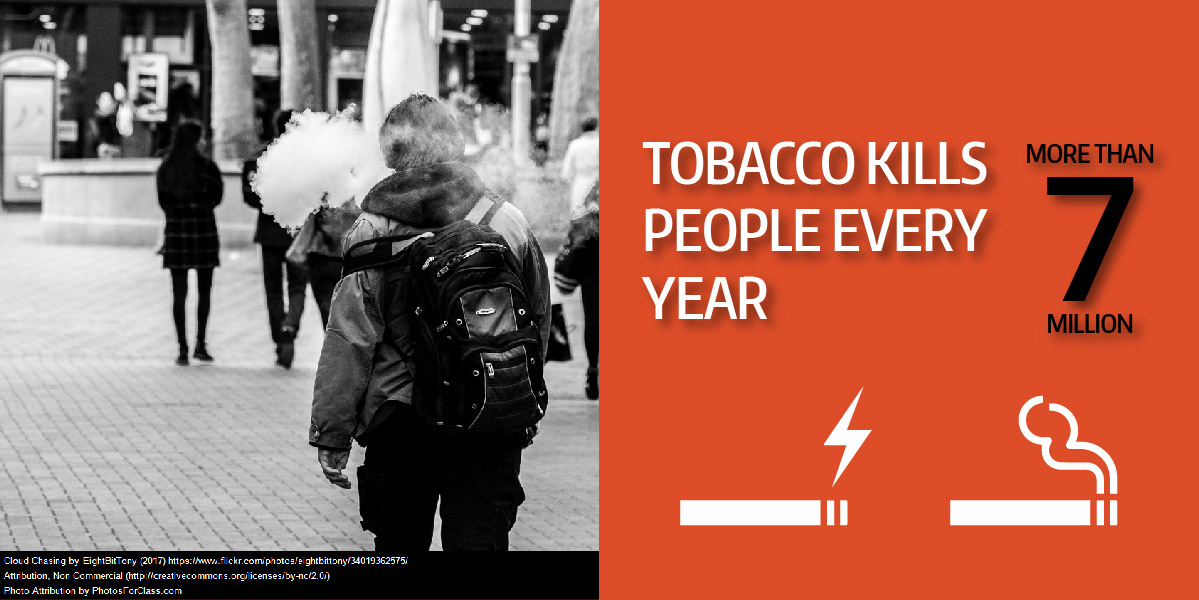Tobacco is the leading cause of preventable death and disease in the United States, as well as a source of serious health disparities globally. The World Health Organization (WHO) estimates that tobacco kills seven million people each year and nearly 80 percent of smokers worldwide live in developing countries.
Although tobacco use among adults has declined in the past 40 years, the Department of Health and Human Services says nearly one in 17 high school seniors in the U.S. was a daily smoker in 2015. Their tobacco product of choice? Electronic cigarettes.

“The increase in youth vaping poses a threat to more than five decades of progress in tobacco control and prevention,” says Hena Parveen, a graduate student at the University of Washington School of Public Health. As part of her capstone, she is working with the Tobacco Prevention Program at Public Health – Seattle & King County to develop a lesson on vaping for 9th graders and an Alternative to Suspension program for students found to be in violation of anti-vaping policy.
While King County school districts use evidence-based curricula to educate students about all drugs including tobacco, there is a gap in knowledge on vaping, says Parveen, who will graduate with an MPH from the School’s Community-Oriented Public Health Program in June. “The overall goal of this project is to augment efforts to reduce and prevent the use of vapes among youth by increasing knowledge and awareness about vaping through classroom education,” she adds.
This World No Tobacco Day, on May 31, the WHO and partner organizations call out tobacco as “a threat to development.” Through a unique program at the UW School of Public Health, Parveen and other students are bringing to light the impact the tobacco industry has on the health, economic and educational well-being of communities close to home.
Over the past 15 years, the Tobacco Studies Program, housed within the School’s Department of Health Services, has built a pipeline of skilled researchers and clinicians to organizations focused on tobacco prevention, cessation and control.
Here is a roundup of some of their work:
- Elizabeth Medeiros, alumna of the Department of Health Services, studied the attitudes and perceptions of student leaders about implementing tobacco-free campus policies at the UW. Medeiros now works at the UW’s Health Promotion Research Center.
- Juliet D’Alessandro, also an alumna of health services, used GPS software to study the links between tobacco retail density, household income and minority populations. D’Alessandro now works as a healthy communities specialist at Snohomish Health District.
- Nick Fradkin, another health services alum, completed his thesis on why tobacco control prevention and treatment is not commonly considered a philanthropic cause.
“We’re building the next generation of tobacco experts,” says Sarah Ross-Viles, director of the program and clinical instructor of health services at the School. “We’re training a workforce to address the biggest threat to health for so many people.”
The Tobacco Studies Program provides scholarship opportunities to masters and doctoral students at the UW for their studies of tobacco and public health. More than 50 scholars, including the three previously mentioned students, have graduated from the program, each completing a thesis or capstone on a tobacco-related project.
The Tobacco Studies Program has offered courses to more than 350 students and 500 drop-in visitors. Every spring quarter, students can take an elective called Tobacco and Public Health, which provides a comprehensive overview of the history, health effects, policy, prevention and treatment of tobacco use. The program also offers an online elective every other quarter called Tobacco-related Health Disparities and Social Justice. In the course, students confront pressing issues of disproportionate tobacco use – why and how tobacco use differs based on socioeconomic status, race, ethnicity and sexual orientation.
“We build compassion for people who are addicted to tobacco and by understanding the factors and environments that lead to tobacco use,” Ross-Viles says. “I think learning about tobacco through a social justice lens improves how we approach the problem.”
To learn more about the program, visit depts.washington.edu/tobacco/.
